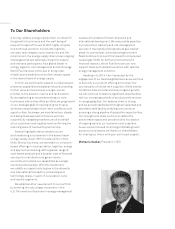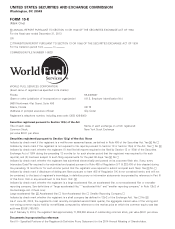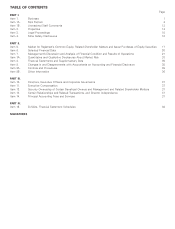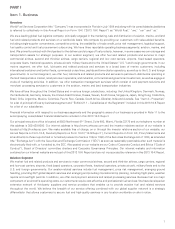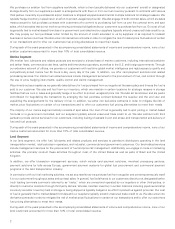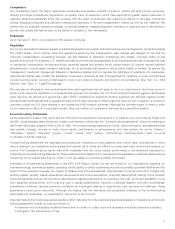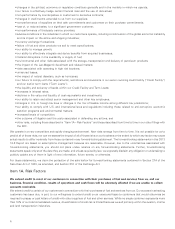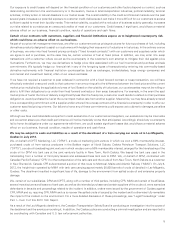World Fuel Services 2013 Annual Report Download - page 11
Download and view the complete annual report
Please find page 11 of the 2013 World Fuel Services annual report below. You can navigate through the pages in the report by either clicking on the pages listed below, or by using the keyword search tool below to find specific information within the annual report.Our exposure to credit losses will depend on the financial condition of our customers and other factors beyond our control, such as
deteriorating conditions in the world economy or in the aviation, marine or land transportation industries, political instability, terrorist
activities, military action or natural disasters in our market areas. The overall volatility in the credit and financial markets over the past
several years increases our potential exposure to customer credit risk because it can make it more difficult for our customers to access
sufficient capital to meet their liquidity needs. This market volatility, coupled with a reduction of business activity generally, increases
our risks related to our status as an unsecured creditor of most of our customers. Credit losses, if significant, would have a material
adverse effect on our business, financial condition, results of operations and cash flows.
Certain of our contracts with customers, suppliers and financial institutions expose us to heightened counterparty risk,
which could have an adverse effect on our business.
As part of our price risk management services, we offer our customers various pricing structures for future purchases of fuel, including
derivatives products designed to assist our customers with hedging their exposure to fluctuations in fuel prices. In the ordinary course
of business, we enter into fixed forward pricing contracts (‘‘fixed forward contracts’’) with our customers and suppliers under which
we agree to sell or purchase, as the case may be, certain volumes of fuel at fixed prices. In addition, we may enter into swap
transactions with a customer where we act as the counterparty in the customer’s own attempt to mitigate their risk against price
fluctuations. Furthermore, we may use derivatives to hedge price risks associated with our fuel inventories and purchase and sale
commitments. We typically hedge our financial risk in any of the foregoing types of transactions by entering into commodity-based
derivative instruments with financial institution counterparties (such as exchanges, broker/dealers, large energy companies and
commercial and investment banks), often on an unsecured basis.
If we have not required a customer to post collateral in connection with a fixed forward contract or swap transaction, we will have
effectively extended unsecured credit to that customer in an amount equal to the difference between the fixed price and the current
market price multiplied by the applicable volumes of fuel. Based on the volatility of fuel prices, our counterparties may not be willing or
able to fulfill their obligations to us under their fixed forward contracts or their swap transactions. For example, in the event the spot
market price of fuel at the time of delivery is significantly less than the fixed price, a customer could decide to default on their purchase
obligation to us and purchase the fuel at the current spot market rate from another supplier. Meanwhile, we may have already entered
into a corresponding commitment with a supplier and/or entered into a swap contract with a financial counterparty in order to offer our
customer specified pricing or terms. Our failure to honor any of these commitments could expose us to claims for damages, penalties
or other costs.
Although we have credit standards and perform credit evaluations of our customers and suppliers, our evaluations may be inaccurate
and we cannot assure you that credit performance will not be materially worse than anticipated. Accordingly, should any counterparty
fail to honor its obligations under our agreements with them, we could sustain significant losses that would have a material adverse
effect on our business, financial condition, results of operations and cash flows.
We may be subject to costs and liabilities as a result of the derailment of a train carrying our crude oil in Lac-M ´
egantic,
Quebec in July 2013.
We, on behalf of DPTS Marketing, LLC (‘‘DPM’’), a crude oil marketing joint venture in which we own a 50% membership interest,
purchased crude oil from various producers in the Bakken region of North Dakota. Dakota Petroleum Transport Solutions, LLC
(‘‘DPTS’’), a crude oil transloading joint venture in which we also own a 50% membership interest, arranged for the transloading of the
crude oil for DPM into tank cars at the joint venture’s facility in New Town, North Dakota. We leased the tank cars used in the
transloading from a number of third party lessors and subleased these tank cars to DPM. We, on behalf of DPM, contracted with
Canadian Pacific Railway (‘‘CPR’’) for the transportation of the tank cars and the crude oil from New Town, North Dakota to a customer
in New Brunswick, Canada. CPR subcontracted a portion of that route to Montreal, Maine and Atlantic Railway (‘‘MMA’’). On July 6,
2013, the freight train operated by MMA with tank cars carrying approximately 50,000 barrels of crude oil derailed in Lac-M ´
egantic,
Quebec. The derailment resulted in significant loss of life, damage to the environment from spilled crude oil and extensive property
damage.
We, certain of our subsidiaries, DPM and DPTS, along with a number of third parties, including CPR, MMA and certain of its affiliates,
several manufacturers and lessors of tank cars, as well as the intended purchaser and certain suppliers of the crude oil, were named as
defendants in lawsuits and proceedings related to the incident. In addition, orders were issued by the government of Quebec against
CPR, MMA and us, requiring CPR, MMA and us to recover the spilled crude oil caused by the incident and to otherwise fully remediate
the impact of the incident on the environment. For a more detailed discussion of these proceedings, see ‘‘Legal Proceedings’’ under
Part I – Item 3 of this 2013 10-K Report.
As a result of the Lac-M ´
egantic derailment, the Canadian Transportation Safety Board is conducting an investigation into the cause of
the derailment and the events surrounding it. In addition, the Quebec police are conducting a criminal investigation and are reported to
be coordinating with Canadian and U.S. law enforcement authorities.
5


